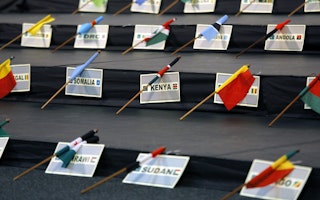Championing Reparations for Africans and People of African Descent
By Jasmine Mickens

In the past few years, the Republic of Ghana has emerged as a powerful advocate, pushing the African Union to adopt a more unified and decisive stance as global discussions on reparations for people of African descent reach a critical juncture. The crescendo of this momentum was apparent this past February when the African Union declared reparations as their newest flagship and the theme for 2025 as “Justice for Africans and people of African descent through reparations.” The move underlined a historic commitment to pursuing the “reparations owed to Africans both on the continent and in the diaspora, acknowledging the profound harm caused by the transatlantic slave trade, slavery, colonialism, and neo-colonialism.”
The growing momentum on the need for reparations stands as a testament to decades of tireless scholarship, advocacy, and organizing in the pursuit of justice for Africans and people of African descent. Any vision for a just future must acknowledge that today’s global inequities are deeply rooted in centuries of exploitation and injustice. The economic disparities, climate crises, and ongoing systemic violence of today are direct legacies of colonialism, apartheid, and slavery. To truly move forward, we need to confront harm head-on, committing to repair and justice.
In 2021, the Open Society Foundations stepped into supporting the work on reparations knowing that real change demands it. We created a new, multi-tiered funding approach that allowed us to support the strengthening of the global reparations movement’s infrastructure, help make it sustainable, and resource efforts connecting work across and between Africa, Latin America, the Caribbean, the UK, and the United States.
This has included working with academics to bring cohesion to the knowledge production on racial justice and reparations, working with legal experts to examine new ways to use the law to support reparations, and advancing approaches that demonstrate self-determined pathways to repair—as defined by the people who were harmed and not former colonial powers.
Our role as funders is to support reparations work while respecting the autonomy of Africans and people of African descent. Our approach to supporting the reparations ecosystem has been operationalized through three interconnected pillars: community power-building, advancing jurisprudence on reparations, and strengthening academic collaboration.
We have supported groups like the Institute for Race, Power and Political Economy, and the African Futures Lab to develop customized models for repair that are focused on creating prototypes for reparations models that could be scaled. We have supported the advancement of jurisprudence on reparations by supporting organizations like the African Judges and Jurists and the Center for International Law and Policy for Africa, who are both shaping national and international legal frameworks to better be able to redress for past harms.
The University of West Indies (UWI), home to the world’s first and only master’s program on reparatory justice, has been another key partner that we have collaborated with to advance the academic and research field focused on reparative justice. We supported a transcontinental alliance involving five interlinked UWI entities: the Centre for Reparations Research, the PJ Patterson Institute for African-Caribbean Advocacy, the University of Lagos-UWI Institute of African and Diaspora Studies, the University of Johannesburg-UWI Centre for Global African Studies, and UWItv. By harnessing the collective power of these pillars, we aimed to support work that is driving meaningful change and creating a lasting impact on the international reparatory justice landscape.
Open Society has also been working to bring together key voices in the reparations movement. In September, the Gender, Race, and Power opportunity organized an event on the sidelines of the UN General Assembly, entitled The World to Be Imagined: Afro-Diplomacy and Reparative Futures that was co-hosted by the Open Society Foundations and the governments of Barbados and Ghana.
The guests of honor at the event included, among others, Ghana’s president, Nana Addo Dankwa Akufo-Addo, who pushed for 2025 to be the African Union’s Year of Reparations, and Barbados’s prime minister, Mia Mottley, a powerful advocate for reparations given her nation’s history of slavery, Brazil’s minister for racial equity, Anielle Franco, and representatives from the UN Permanent Forum for People of African Descent. The event sought to exercise our muscle of imagination and to cultivate global solidarity to guide us on a path forward—while highlighting the profound role that Black women have played and continue to play in shaping the reparations movement.
By supporting the reparations movement, and drawing on its history of struggle, we hope to help realize the aspirations of Africans and people of African descent who are striving toward a world grounded in genuine righting of past wrongs, and setting the stage for a more just future.
Jasmine Mickens is an advocacy officer of Programs for the Open Society Foundations.


